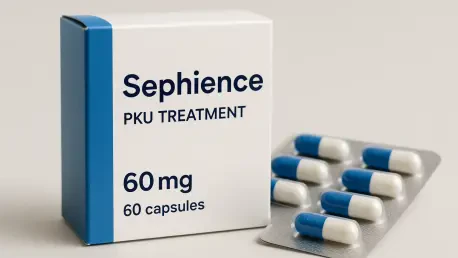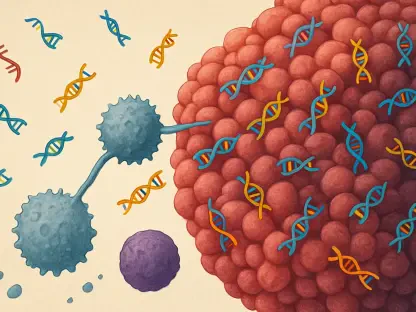Imagine living with a condition where even a small bite of protein-rich food could lead to severe neurological damage, a daily reality for thousands of individuals in the U.S. diagnosed with phenylketonuria (PKU), a rare genetic metabolic disorder. Affecting approximately one in every 13,500 to 19,000 newborns, PKU arises from a deficiency in an enzyme needed to metabolize phenylalanine, an amino acid found in most protein-containing foods, leading to harmful buildup in the blood if unmanaged.
The recent approval by the U.S. Food and Drug Administration (FDA) of Sephience (sepiapterin), developed by PTC Therapeutics, marks a pivotal moment in addressing this challenge. This FAQ article aims to answer critical questions surrounding this innovative treatment, exploring its mechanism, impact, and significance for the PKU community. Readers can expect to gain a comprehensive understanding of how this drug works, the clinical evidence supporting its approval, and its potential to transform lives.
This content delves into specific aspects of Sephience, including its application across different age groups and PKU subtypes, as well as the broader implications for dietary management. By breaking down complex information into clear, accessible answers, the goal is to provide valuable insights for patients, caregivers, and anyone interested in advancements in rare disease therapies.
Key Questions About Sephience and PKU Treatment
What Is Phenylketonuria (PKU) and Why Is It Significant?
Phenylketonuria, commonly known as PKU, is a rare inherited disorder that disrupts the body’s ability to process phenylalanine, a component of proteins. Without proper intervention, the accumulation of this amino acid can cause profound intellectual disability, seizures, and other neurological issues, making early diagnosis and management essential. The condition often requires a lifelong commitment to a highly restrictive diet, limiting protein intake to prevent toxic buildup.
The significance of PKU lies in its impact on quality of life, as strict dietary adherence can be burdensome for patients and families. Social and psychological challenges often accompany the need to avoid common foods, highlighting the urgent need for alternative treatments that can ease these constraints while maintaining health.
This backdrop of difficulty underscores the importance of new therapeutic options. With the FDA’s approval of Sephience, there is now a promising tool to address these longstanding struggles, offering hope to a community in need of innovative solutions.
What Is Sephience and How Does It Work?
Sephience, known scientifically as sepiapterin, is a newly approved drug by the FDA for managing hyperphenylalaninemia (HPA) in patients with PKU. Designed to complement a phenylalanine-restricted diet, it is suitable for both adults and children as young as one month who respond to sepiapterin therapy. The drug functions as a natural precursor to BH4, an enzymatic cofactor that helps reduce blood phenylalanine levels effectively.
The mechanism of Sephience offers a distinct advantage by targeting the biochemical root of PKU. By facilitating the metabolism of phenylalanine, it helps prevent the dangerous accumulation that leads to neurological harm. This approach represents a shift from solely relying on dietary control to incorporating pharmacological support.
Clinical evidence from the late-stage APHENITY trial supports its efficacy, showing a remarkable 63% mean reduction in phenylalanine levels among treated patients. For those with classical PKU, the reduction was even higher at 69%, demonstrating the drug’s potential to make a substantial difference in managing this condition.
Who Can Benefit from Sephience?
The approval of Sephience comes with broad labeling, indicating its applicability across a wide range of PKU patients. This includes both pediatric and adult individuals diagnosed with sepiapterin-responsive PKU, starting from the age of one month. Such inclusivity ensures that diverse patient groups, regardless of age or specific subtype, can access this treatment.
This versatility addresses a significant unmet need within the PKU population, where treatment options have historically been limited. Many patients struggle with maintaining strict dietary restrictions over time, and Sephience provides an additional layer of control that can adapt to varying needs and circumstances.
Feedback from industry leaders, such as PTC Therapeutics’ CEO Matthew Klein, emphasizes a commitment to rapid delivery of this therapy to eligible individuals in the U.S. This urgency reflects an understanding of the profound impact that timely access can have on patient outcomes and overall well-being.
How Does Sephience Impact Dietary Management for PKU Patients?
One of the most transformative aspects of Sephience is its potential to liberalize dietary restrictions for PKU patients. Traditionally, managing the condition has required severe limitations on protein intake, often leading to nutritional challenges and social isolation. This new treatment offers a way to ease these burdens while still controlling phenylalanine levels.
Data from the APHENITY long-term extension (LTE) study highlights this benefit, revealing that over 97% of participants in the phenylalanine tolerance protocol were able to relax their dietary constraints while using Sephience. Moreover, there was a striking mean increase in protein intake of 126%, showcasing a significant improvement in dietary flexibility.
This shift not only enhances nutritional options but also improves the psychological and social aspects of living with PKU. The ability to enjoy a broader range of foods can foster a sense of normalcy, reducing the emotional strain associated with constant dietary vigilance.
What Does the Approval of Sephience Mean for the Future of PKU Care?
The FDA’s decision to approve Sephience signals a broader movement toward personalized and effective therapies for rare disorders. This milestone validates the scientific innovation behind the drug and sets a precedent for future research and development in metabolic disease management. It reflects a growing recognition of the need for tailored solutions that address specific patient challenges.
Beyond individual benefits, this approval fosters optimism within the PKU community, as voiced by Catherine Warren, executive director of the National PKU Alliance. The renewed hope for better quality of life underscores the potential of Sephience to redefine standards of care and inspire further advancements in treatment strategies.
Looking ahead, the success of this drug may encourage ongoing studies and innovations, potentially leading to even more comprehensive approaches to managing PKU. The focus on integrating pharmacological and lifestyle interventions could pave the way for a more holistic framework in rare disease care.
Summary of Key Insights
The approval of Sephience by the FDA stands as a landmark achievement in the treatment of phenylketonuria, providing a novel option that significantly lowers blood phenylalanine levels. This therapy, supported by robust clinical data from trials like APHENITY, demonstrates impressive outcomes, including a substantial reduction in phenylalanine and enhanced dietary freedom for patients. Its broad applicability across ages and PKU subtypes ensures that many can benefit from this advancement.
Stakeholder enthusiasm, from industry leaders to patient advocacy groups, reinforces the importance of this development. The drug’s ability to transform dietary management while maintaining health outcomes addresses a critical gap in PKU care. This collective support highlights Sephience as a cornerstone in improving patient well-being.
For those seeking deeper knowledge, exploring resources from organizations like the National PKU Alliance can provide additional context and support. Engaging with community networks and staying informed about ongoing research are valuable steps for understanding the evolving landscape of PKU treatment.
Final Thoughts on a New Era in PKU Treatment
Reflecting on the journey that led to the approval of Sephience, it becomes clear that this milestone represents a turning point for countless individuals grappling with the challenges of PKU. The dedication to advancing care through scientific innovation has culminated in a therapy that not only addresses biochemical imbalances but also uplifts the human spirit by easing daily struggles.
As a next step, patients and caregivers are encouraged to consult healthcare providers to determine eligibility for Sephience and understand how it can integrate into existing management plans. Staying proactive in exploring emerging therapies and participating in support networks has proven vital for navigating the complexities of rare disorders.
Looking toward the future, the momentum created by this approval inspires a call to action for continued advocacy and research investment. By fostering collaboration among medical professionals, researchers, and communities, the path has been laid for even greater strides in enhancing life quality for those affected by PKU.









